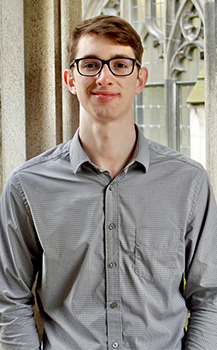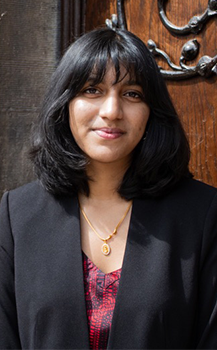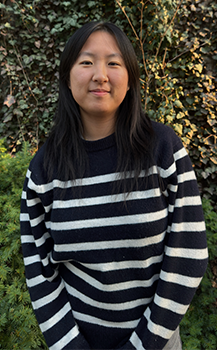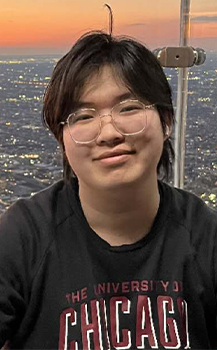University of Chicago rising fourth-year students Connor Blake, Prithi Srinivasan, Melody Tang and Leon Lee Zhou have been awarded Barry Goldwater Scholarships.Established by Congress in 1986, the Barry Goldwater Scholarship is one of the most prestigious national awards that recognizes undergraduates who intend to pursue research careers in natural science, mathematics and engineering.
The four undergraduates are among 441 winners for 2025 selected from a pool of over 5,000 applicants from universities across the country. Designed to help STEM students continue their research during their final years of undergraduate study, these scholarships will help cover winners’ cost of tuition, fees, books, room and board up to $7,500 per year
Meet the recipients below:
Connor Blake

Blake, a native of Houston, is majoring in quantum molecular engineering. He knew UChicago was the place for him as early as the Admitted Student Open House that he attended.
“I vividly remember sitting in on an undergraduate research panel during an admitted student event where four students seemingly could not talk fast enough about how much they loved working on their research projects, and I decided these were the people for me,” Blake said.
During his time at the College, Blake has been inspired by a culture of engaged undergraduate research. Being surrounded by students who are passionate about research and “professors who are at the top of their fields and leading us to the edge of current knowledge,” is powering his work on quantum error correction protocols.
Tell us about your research.
My current research, which I do in Professor Liang Jiang’s group, explores ways to improve quantum error correction protocols in superconducting systems. My work combines a mix of computational modeling and theoretical formulations to try to identify and fix inefficiencies in the current state-of-the-art methods which are still several orders of magnitude away from optimality.
Previously, I worked on building self-driving thin-film synthesis using machine learning in Professor Shuolong Yang’s lab. It’s a tedious process but our technique autonomously achieves both high throughput and accuracy in growing thin films—a method that hopefully can be scaled up to more complex materials.
What does it mean to you to receive the Goldwater Scholarship?
Over the past three years of research, I’ve come to appreciate just how difficult generating new scientific knowledge is, so receiving the Goldwater Scholarship is an incredible affirmation of the work I have invested in contributing to that process.
I’d particularly like to thank professors Jiang and Yang, as well as Pierre Darancet at the Argonne National Laboratory, for their guidance and support. I'd also like to thank Clay Anderson and professors David Mazziotti, Mark Stoykovich and Suri Vaikuntanathan, along with many other excellent teachers, for deepening my love of science and challenging me with interesting problems.
Finally, I'd like to thank my parents and grandparents for their endless encouragement and support along my scientific journey.
Prithi Srinivasan

One class made all the difference for Srinivasan.
From Mountain View, Calif., Srinivasan originally was set on majoring in economics and statistics when she arrived on campus, but the course “Molecular Biology of the Cell” changed her mind.
“I immediately fell in love with molecular biology,” she said. “The class really allowed me to engage with research in a way that I never had before, diving into primary literature, designing experiments. Creativity and inquisitiveness were really encouraged—and this was something I was able to bring with me throughout my biology classes in the years following.”
Srinivasan believes that by giving her the freedom to pursue questions in new ways and emboldening her scientific creativity, UChicago has helped her develop the capacities necessary to conduct important research—capacities that have also led to her receiving this prestigious scholarship.
Tell us about your research.
My research is centered on the process of nuclear import, which is driven by factors called importins. By biochemically prodding at the mechanisms by which importins recognize their specific “cargo” and release them into the nucleus, we can begin to better understand the processes governing genomic accessibility and integrity.
More specifically, I am studying the nuclear import of a protein called actin. Gaining an insight into the factors regulating it nuclear entry and deposition, we have not only begun to understand how it is able to achieve its nuclear role, but also its non-canonical significance in regulating gene expression.
What does it mean to you to receive the Goldwater Scholarship?
Receiving the Goldwater Scholarship is an incredible recognition. It not only affirms the work I have begun, but what I hope to achieve as I continue to pursue a future in science.
I am incredibly grateful for the support of the Biological Sciences Collegiate Division, Alex Ruthenburg and especially my mentor, Amanda Keplinger. Through my own work in the lab and through countless conversations about interesting science, I have been able to explore the questions that excite me, find new ways to probe biological systems, and grow as a scientific communicator. And finally, I would like to thank my parents –– for encouraging me to keep at it, for putting up with all my practice talks, for reassuring me that I am doing “importin-t” work.
Melody Tang

Science, specifically chemistry, had always intrigued Tang, a chemistry and biological chemistry major from Los Angeles.
“Chemistry was always intriguing to me, even before I knew what it meant and how broad of a field it was,” Tang said. “Being able to take classes through high school and college allowed me to explore the different subjects and discover my interest in organic chemistry.”
UChicago allowed her to learn more and focus on her work in the field—one in which she hopes to eventually earn her Ph.D. Tang loves being able to talk about questions related to research and knows that the Goldwater Scholarship will position her to answer them as a career scientist.
Tell us about your research.
My research interest focuses on developing new methods and reactions to build complexity in molecules. Expanding the chemical toolbox for these transformations allows for more efficient means of working towards building novel drug molecules or materials with tunable properties.
As a part of Professor Guangbin Dong’s research group, I have learned how to best approach answering these questions, as well as how to begin formulating my own questions and ideas
What does it mean to you to receive the Goldwater Scholarship?
It is incredibly meaningful and a great honor to receive the Goldwater Scholarship. It is inspiring to know that this research is meaningful, and the award is encouraging to me to continue working towards a future in science.
I would not be able to reach this point without everyone who has supported me through my academics and research, including my family and friends. I would like to especially thank Professor Guangbin Dong and my postdoctoral mentor Jingfeng Huo, who has taught and guided me each day. I would also like to thank Professor John Hartwig and Professor Hosea Nelson for their help through the application process.
Leon Lee Zhou

Zhou sees biology as more than just science. The rising fourth-year student from Celina, Texas views it as a device to “communicate, collaborate and ultimately solve problems” thanks to several mentors who have shown him the power of the discipline.
“Through each project, I’ve seen how research can drive meaningful change in medicine, and these experiences have guided me to pursue a career as a physician-scientist,” he said.
With graduate school hopefully in his future, Zhou’s goal is to use the lessons that his professors have taught him to uncover how diseases develop at a molecular level. The Goldwater Scholarship will allow him to further his education and continue to discover potential pathways towards treatments and cures.
Tell us about your research.
What draws me most to therapeutic targeting research is its potential to directly inform how we treat disease. I’m especially interested in questions that connect basic molecular mechanisms to broader biological networks—how small changes can lead to complex dysfunctions, and how we might reverse those changes.
Ultimately, I want to be part of a future where science and medicine continually inform each other—where discoveries in the lab translate into better outcomes for patients.
What does it mean to you to receive the Goldwater Scholarship?
Receiving the Goldwater Scholarship is a tremendous honor, and I’m deeply grateful for the support and recognition it represents. More than anything, it reinforces my commitment to a career in scientific research and medicine.
I want to especially thank professors Arvind Murugan and Stephen J. Kron for giving me the opportunity to lead my own projects in their labs which were formative experiences that taught me how to think and act independently as a scientist. I’m also grateful to professors Chuan He and David Zemmour for introducing me to unique areas of research in biochemistry and immunology, and for expanding my appreciation of how diverse approaches can come together to solve complex biological problems.
This award would not have been possible without their support and guidance throughout my development as a researcher.
The College’s Goldwater scholars were supported by the Office of National Fellowships, which guides candidates through rigorous application processes for nationally competitive awards. The National Fellowships team helps students identify and articulate how their unique talents and distinctive paths prepare them to realize a better world.